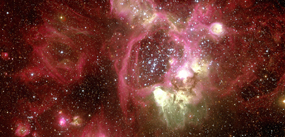Syllabus
Printable syllabus [pdf]
ASTRONOMY 301
Introduction to Astronomy
Fall 2013 Unique No. 48490 | TTh 12:30-1:45 pm | WEL 3.502
|
PROFESSOR |
PRIMARY TEACHING ASSISTANT |
|
ADDITIONAL |
TEXTBOOK
Required: We’re Texas: Astronomy by Winget, Hermes, and Shawl et al. (any edition)
LEVEL OF COURSE
This course is a descriptive survey of the field of astrophysics. I will not emphasize mathematics. However, an understanding of basic algebra will be helpful. The course will provide you with a perspective on the universe: its scale, structure, contents, and evolution. It will cover major scientific revolutions in human thought including special and general relativity and quantum mechanics, up to and including our current struggles to understand dark matter and dark energy.
EXAMS AND GRADES
There will be a total of four in-class exams. Your grade will be determined from the best three exam scores, weighted 25% each. Three homework assignments, equally weighted, will constitute 15% of your overall grade. An astronomical observing assignment will account for an additional 10%. You have the option to complete a semester project, on a topic of your choosing to replace your lowest exam score (it may not replace a 0). The TAs or I must approve the topic in advance of the topic deadline. As a result of this grading policy, we do not give make-up exams. This course is finished on Dec. 5; there will be no exam during the finals period.
At the end of the semester, your points out of 200 will translate to the following grades:
A: 200-180; B: 179-160; C: 159-140; D: 139-120; F: 119-0
Grade thresholds may be revised down based on class performance. Students immediately below a grade boundary will be awarded "plus" (e.g. B+, C+) grades at our discretion. No "minus" grades will be assigned.
OPTIONAL SEMESTER PROJECTS
The optional semester project is very open-ended, but should relate astronomy to something you are passionate about. This is a chance for you to be creative, and spend time researching and thinking about astronomy from a perspective that interests you. We want you to learn and enjoy the experience, mindful also that the optional project counts as much as an exam, so the work you put into it will be reflected in the grade you get out of it. The deadline for optional semester project approval is Thursday, 26 September 2013. Please double check with Keaton or Sam to make sure that we have your topic written down and not just simply verbally approved. You may not work in groups for the optional project; all work must be your own. Stuck without an idea? Start with these questions: What is a major life interest—an academic major or a hobby? What do you enjoy creating or doing, and how can you connect it to astronomy? If you are having trouble finding a connection of an interest or passion to astronomy, come see us; we are here to help you! The firm deadline for turning in projects is Tuesday, 3 December 2013. You may turn projects in during class or during our office hours. You are free to submit your project earlier than the firm deadline. The projects will take about a week to grade. Project grades will be posted on Blackboard. After they are graded, the projects will most likely end up in my office or the adjacent research lab for safekeeping. Please schedule a time via email to pick them up from us once the semester is complete.
DUMB QUESTIONS
There is no such thing as a dumb question. ASK!!
COURSE WEB SITE
Please visit the Blackboard page for this course to find regular updates. A link is at the course web page: https://www.as.utexas.edu/astronomy/education/fall13/winget/301.html
STUDENTS WITH DISABILITIES
Upon request, the University of Texas at Austin provides appropriate academic adjustments for qualified students with disabilities. You can find resources and contact information online at the web site for the Disability Resources Center: http://www.utexas.edu/disability.
TENTATIVE TEST SCHEDULE
The following is a tentative schedule of the four multiple-choice exams (it is subject to change). There will be a review held the evening before each exam, although not necessarily in the classroom.
Exam 1: Sep. 19; Exam 2: Oct. 10; Exam 3: Nov. 7; Exam 4: Dec. 5
TENTATIVE COURSE OUTLINE (WITH SUGGESTED READING)
|
Week 1 (8/29) |
Course Introduction; A Tour of the Universe (Ch. 1,2) |
|
|
Week 2 (9/3,5) |
The History of Astronomy; Basic Concepts (Ch. 3,4) |
|
|
Week 3 (9/10,12) |
The Earth and Moon (Ch. 6) |
|
|
Week 4 (9/17,19) |
The Earth and Moon (Ch. 6) |
Exam 1 |
|
Week 5 (9/24,26) |
The Terrestrial Planets (Ch. 7) |
|
|
Week 6 (10/1,3) |
The Jovian Planets (Ch. 8) |
|
|
Week 7 (10/8,10) |
Pluto; Comets; Solar System Formation (Ch. 5) |
Exam 2 |
|
Week 8 (10/15,17) |
Light, Matter, and Energy (Ch. 9) |
|
|
Week 9 (10/22,24) |
Light; Telescopes (Ch. 10) |
|
|
Week 10 (10/29,10/31) |
Stars and Their Radiation (Ch. 11) |
|
|
Week 11 (11/5,7) |
Stellar Classification (Ch. 12,13) |
Exam 3 |
|
Week 12 (11/12,14) |
Star Formation; How Stars Shine (Ch. 14) |
|
|
Week 13 (11/19,21) |
The Death of Stars; Black Holes; Star Clusters (Ch. 15,16) |
|
|
Week 14 (11/26) |
Galaxies; Active Galactic Nuclei; Supermassive Black Holes (Ch. 17,18,19) |
|
|
Week 15 (12/3,5) |
The Big Bang; Cosmology (Ch. 20) |
Exam 4 |

N44 H II region in the Large Magellanic Cloud [ESO]
Professor
RLM 16.236 · (512) 471-3404 · email
Office Hours
Th 2-3, or by appt
Primary TA
Keaton Bell
Secondary TA
Sam Harrold